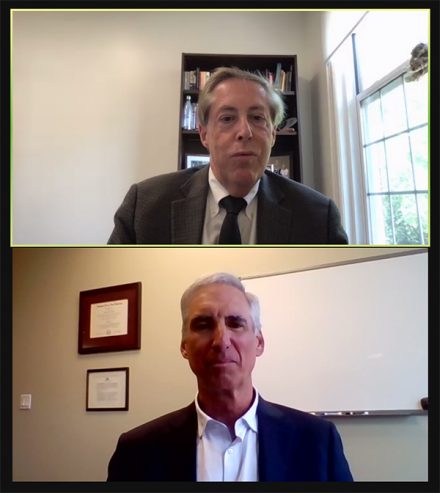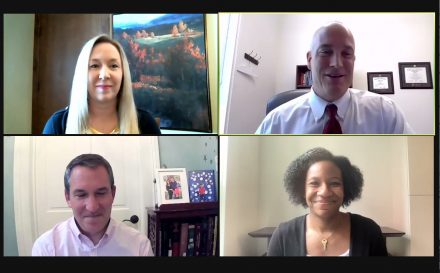The Department of Sport Management hosted its annual symposium on April 28 featuring a one-on-one conversation with former top NCAA executive and West Virginia Athletic Director Oliver Luck, as well as several panel discussions featuring prominent individuals and student-athletes in collegiate sports.
Many observers acknowledge that college athletics is in the midst of its most significant changes in a generation. And the list of reasons is long.

The NCAA’s new one-time transfer rule allows student-athletes the flexibility to move to a new institution and play immediately. Across the country states have widely allowed sports gambling. And, most topical, beginning this summer, college athletes will be allowed to make money by selling their name, image and likeness (NIL) rights while playing in college.
Considering the potential changes to the sports landscape, the annual Elon Sport Management Symposium adopted the theme of “Perspectives at Play in College Athletics” this spring, inviting prominent individuals in collegiate sports to discuss today’s most pressing matters.
The April 28 virtual event kicked off with a one-on-one conversation between Oliver Luck, an influential sports industry figure with past roles leading the NCAA, West Virginia University athletics program and XFL, and Assistant Professor Bill Squadron. Following Luck’s conversation, the symposium shifted gears to panel discussions addressing the NIL debate, the discrepancies between men’s and women’s athletics, and a conversation with current student-athletes.
Click here to view a full recording of the symposium.
“What is so fascinating is the balance of power has shifted from the 1970s … to today,” said Luck of the relationships between coaches and student-athletes.
Noting the arrival of the one-time transfer rule and the NIL law, Luck explained that student-athletes have never had more influence or sway. And with that control comes responsibility.
Luck called for some “guardrails” to protect the athletes, adding that as student-athletes market and brand themselves, they must also balance their time and obligations to academics and their athletic endeavors. This will be tricky because their time is already pulled in so many directions.

Luck envisions positives and negatives coming from the new one-time transfer rule. It provides the student-athletes an opportunity to direct their own path, especially as circumstances change – such as coaching turnover, playing time, personal matters. Albeit, Luck noted that he personally benefited from not transferring as an undergraduate, recalling that he had to work and improve to beat out upperclassmen to earn playing time.
The former athletic director addressed the reduction of several prominent non-revenue generating programs in recent months, including Iowa’s decorated men’s gymnastics program. There have “always been financial pressures” of running a collegiate athletics program, Luck said. “We saw the same thing – sports being cut – happen in 2008 and 2009 following the Recession.”
What Luck said he – and all athletic directors – try to maintain is being “fiscally responsible,” while remaining true to the “cornerstone” of college athletics – that no sport is better or worse than others.
Following Luck and Squadron’s conversation, the symposium transitioned to its “#NotNCAAProperty: Inside the NIL Debate” panel, moderated by Tony Weaver, associate dean in the School of Communications and professor of sport management.

Gabe Feldman, director of the Tulane Sports Law Program and Tulane University’s associate provost for NCAA compliance, opened the panel with a comprehensive recap of the NIL debate, explaining how the college structure – based on amateurism – is unlike any other sports entity across the globe.
What has amazed Feldman is the speed in which the NIL laws have gone into effect in the past 18 months to two years. In that time, all but 11 states have started NIL legislation, Feldman said. For a matter of perspective, he noted that it took about 15 years to get seatbelt laws passed at a similar rate.
Feldman echoed Luck’s earlier sentiments that student-athletes have never had more control. “It is an empowerment of the student-athlete and once NLI universe kicks in … I think that balance of power will continue to shift,” he said.
Fellow panelists Kristi Dosh, a sports business reporter and analyst, and Shelby McKay, assistant director of athletics for student-athlete development at Washington State University, shared their individual perspectives as well, touching on how schools and businesses envision the rule changes.
Dosh said she is currently working on a Forbes magazine article detailing social media marketing firms that are already brainstorming campaigns in the hopes of implementing them right away.
“They are salivating to work with student-athletes,” she said, comparing it to someone firing off a starter’s pistol. “It will come at everyone really fast come July.”
She added it won’t just be big-name athletes who land sponsorships, either.
The second panel, titled “Unlevel Playing Field: The Gender Gap in Athletics,” discussed the discrepancies between men’s and women’s athletics, and current issues that universities face in 2021. Among the panelists were Amy Yakola, deputy commissioner – chief of external affairs for the Atlantic Coast Conference; Amy Perko, CEO of Knight Commission on Intercollegiate Athletics; and Debbie Yow, AD emeritus at North Carolina State University. Cara Lucia, chair of the Department of Sport Management, moderated the session.
The symposium concluded with its “The Student-Athlete’s Point of View” panel, featuring perspectives and opinions from current student-athletes representing different sports, divisions and institutions. Participants included Emma Seif, Wofford College women’s lacrosse; Devin Merritt, Averett University football; Chris Holliday, University of North Carolina football; and Natalie Cummins, Elon University volleyball.
This spring’s Elon Sport Management Symposium was planned by Assistant Professor Shaina Dabb’s Event Management class. While the virtual event was free, donations were accepted to support the Positive Attitude Youth Center in Burlington.


